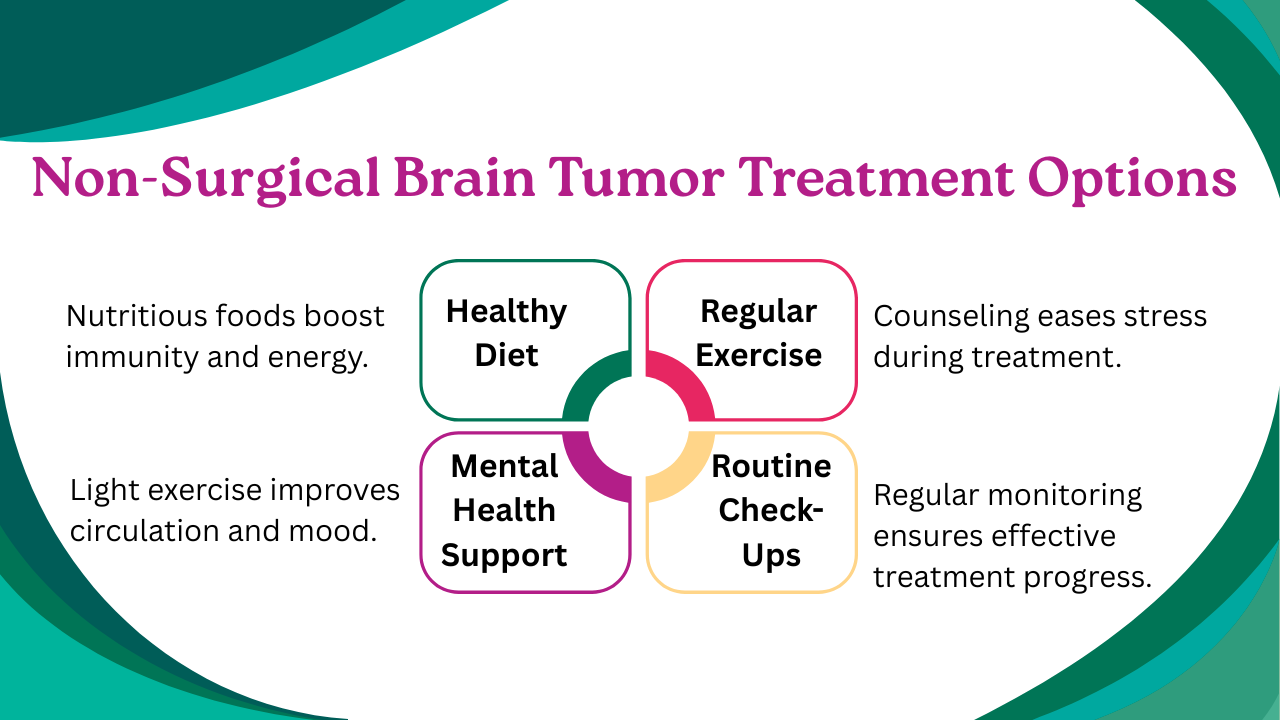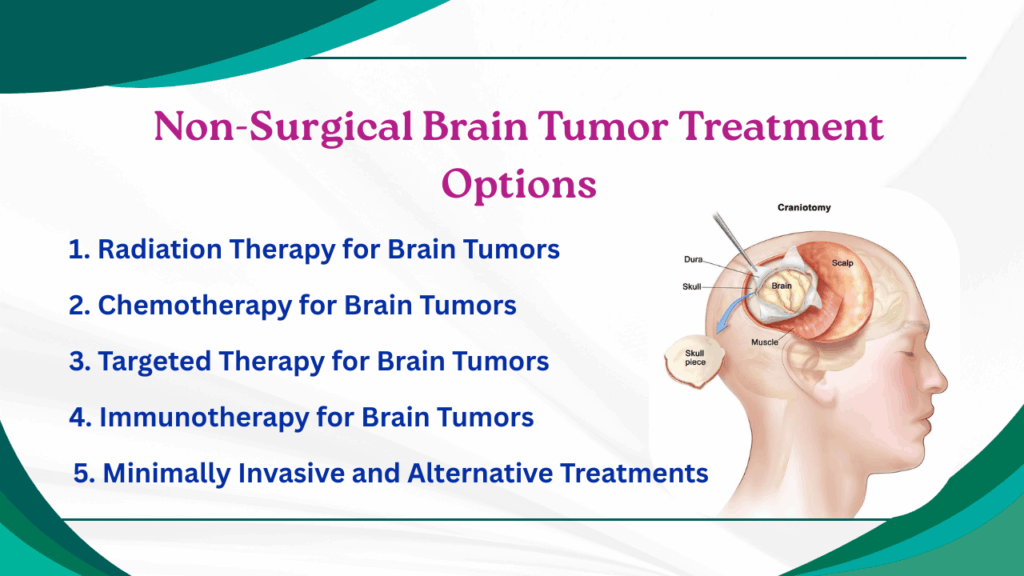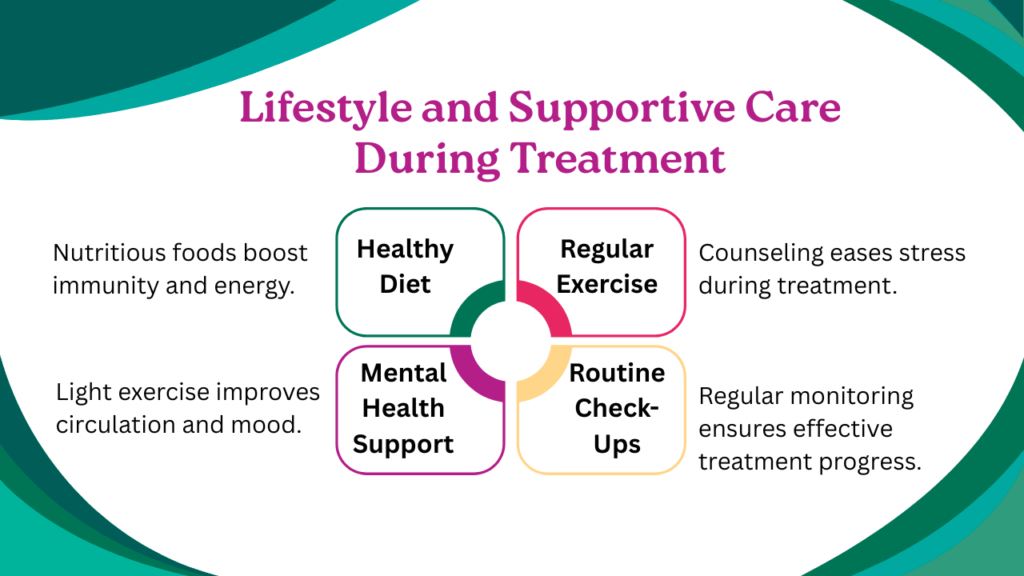Brain Tumor Cure Without Surgery

Modern Approaches at Multispeciality Hospitals in Kadapa — A brain tumor is a serious condition, but today, many patients can find effective treatment without the need for surgery. Thanks to medical advancements, non-surgical brain tumor treatments such as radiation therapy, chemotherapy, targeted therapy, and immunotherapy are helping patients recover safely and comfortably. These non-invasive brain tumor solutions destroy or control tumor cells while protecting healthy brain tissue, reducing pain and recovery time. If you are searching for brain tumor treatment without surgery in Kadapa, trusted centers like Vedantha Hospital, a leading multispeciality hospital in Kadapa, offer advanced brain tumor care using the latest technology and expert doctors. With personalized care plans and modern therapies, patients now have more hope for a brain tumor cure without operation, achieving better results and improved quality of life.
Understanding Brain Tumors: Why Early Treatment Matters
- A brain tumor develops when abnormal cells start growing uncontrollably in the brain or nearby tissues.
- This growth can affect memory, movement, speech, vision, and other important brain functions.
- Brain tumors are of two main types:
- Benign (Non-cancerous): Usually slow-growing and less likely to spread.
- Malignant (Cancerous): Faster-growing and can spread to other parts of the brain or body.
- Benign (Non-cancerous): Usually slow-growing and less likely to spread.
- Early detection plays a vital role in improving treatment success and recovery.
- Common warning signs of a brain tumor include:
- Persistent headaches, especially in the morning
- Dizziness or loss of balance
- Nausea or vomiting
- Blurred or double vision
- Difficulty concentrating or confusion
- Changes in behavior or memory loss
- Persistent headaches, especially in the morning
- If left untreated, a tumor may grow and cause serious complications, affecting brain and body functions.
- In the past, brain tumor surgery was considered the main option for treatment.
- However, not every patient is fit for surgery, especially elderly individuals or those with tumors located in delicate areas of the brain.
- Today, thanks to advanced medical technology, multispeciality hospitals in Kadapa, such as Vedantha Hospital, offer a range of non-surgical brain tumor treatments, including:
- Radiation Therapy – uses high-energy rays to destroy tumor cells.
- Targeted Therapy – attacks specific molecules responsible for tumor growth.
- Chemotherapy – uses powerful medicines to stop or slow down cancer cell growth.
- Immunotherapy – strengthens the body’s immune system to fight cancer cells naturally.
- Radiation Therapy – uses high-energy rays to destroy tumor cells.
These advanced, non-invasive treatments provide safe, effective, and personalized care, helping patients recover faster and live a better quality of life.
Non-Surgical Brain Tumor Treatment Options

Modern medical science now offers several non-invasive and minimally invasive treatment options for patients diagnosed with brain tumors. These advanced therapies focus on effectively targeting and controlling tumor growth while protecting healthy brain tissue. For those who are not suitable candidates for surgery, these treatments provide safe, reliable, and life-improving alternatives.
1. Radiation Therapy for Brain Tumors
Radiation therapy is one of the most widely used non-surgical treatments for brain tumors. It uses high-energy rays or particles to damage and destroy tumor cells, preventing them from growing further. This treatment is particularly effective for patients who cannot undergo surgery due to medical reasons or tumor location.
Types of radiation therapy include:
- External Beam Radiation Therapy (EBRT): Delivers precise beams of radiation from a machine outside the body directly to the tumor.
- Stereotactic Radiosurgery (Gamma Knife or CyberKnife): A highly focused form of radiation that targets the tumor with extreme accuracy, minimizing harm to surrounding healthy tissues.
- Proton Therapy: A specialized and advanced form of radiation that uses protons instead of X-rays, offering more precise targeting with fewer side effects.
Radiation therapy is performed over multiple sessions and helps control tumor growth, reduce symptoms, and improve overall quality of life.
2. Chemotherapy for Brain Tumors
Chemotherapy uses powerful medicines to kill or stop the growth of cancer cells. These drugs can be given orally (as tablets) or intravenously (through a vein). Chemotherapy is often used in combination with other treatments to increase effectiveness.
For brain tumor patients, chemotherapy helps to:
- Slow down tumor growth and reduce pressure in the brain.
- Shrink the tumor, making it easier to manage.
- Prevent recurrence of cancer after radiation or surgery.
Modern hospitals now combine chemotherapy with targeted therapy to enhance treatment outcomes while minimizing side effects. Regular monitoring ensures that each patient receives a personalized dose suited to their health condition.
3. Targeted Therapy for Brain Tumors
Targeted therapy is a modern and personalized treatment designed to attack specific molecules or genetic changes that cause tumor growth. Unlike chemotherapy, which affects both healthy and cancerous cells, targeted therapy focuses only on cancerous cells, reducing damage to normal brain tissue.
Key benefits of targeted therapy include:
- Fewer side effects compared to traditional chemotherapy.
- Effective against tumors that are resistant to other forms of treatment.
- Can be used in combination with radiation therapy or immunotherapy for enhanced results.
This form of advanced brain tumor treatment is becoming more common in multispeciality hospitals in Kadapa, where oncologists personalize therapy plans based on the tumor’s genetic profile.
4. Immunotherapy for Brain Tumors
Immunotherapy is an innovative approach that strengthens the body’s natural immune system to identify and attack cancer cells. Instead of killing tumor cells directly, it helps the immune system recognize them as threats and destroy them effectively.
Common immunotherapy techniques include:
- Monoclonal Antibodies: Laboratory-made proteins that attach to specific tumor cells and help the immune system destroy them.
- Checkpoint Inhibitors: Drugs that remove “brakes” from the immune system, allowing it to fight cancer cells more effectively.
- Cancer Vaccines: Stimulate the immune system to recognize and attack specific tumor markers.
Although immunotherapy is still under active research, it has shown great promise in managing certain types of brain tumors. Many patients experience improved survival rates and better quality of life through this non-surgical brain tumor solution.
5. Minimally Invasive and Alternative Treatments
In recent years, minimally invasive brain tumor treatments have gained popularity for their precision, safety, and faster recovery times. These methods use advanced technologies to target the tumor without the need for open surgery.
Some of the latest techniques include:
- Laser Interstitial Thermal Therapy (LITT): Uses laser heat to destroy small tumors safely with minimal damage to surrounding tissue.
- Focused Ultrasound: A non-invasive method that uses high-intensity sound waves to target and treat tumors without incisions.
- Tumor Ablation Techniques: Use heat or cold energy to destroy tumor tissue precisely.
Advantages of Non-Surgical Brain Tumor Treatments
Choosing brain tumor management without surgery has several benefits:
- Reduced Risk: Avoid complications associated with major brain surgery
- Shorter Recovery Time: Patients often return to daily life faster
- Preservation of Brain Function: Minimizes the risk of affecting nearby healthy tissue
- Multiple Treatment Options: Combines radiation, chemotherapy, and targeted therapies
- Suitable for High-Risk Patients: Elderly patients or those with other health conditions can safely undergo these treatments
How Non-Surgical Treatments Are Delivered at Multispeciality Hospitals in Kadapa
Leading multispeciality hospitals in Kadapa, such as Vedantha Hospital, are transforming how brain tumors are treated — offering safe, effective, and personalized non-surgical brain tumor treatments. These hospitals focus on advanced diagnostics, precision therapies, and compassionate patient care to ensure the best possible outcomes.
- Advanced Diagnostics: State-of-the-art imaging tools like MRI, CT scans, and PET scans help doctors accurately identify the tumor’s location, size, and characteristics for precise treatment planning.
- Personalized Treatment Plans: Every patient receives a customized therapy plan based on their tumor type, stage, and overall health, ensuring maximum effectiveness with minimal side effects.
- Multidisciplinary Approach: Teams of neurologists, oncologists, neurosurgeons, and radiologists work together to create an integrated treatment plan that addresses all aspects of the patient’s condition.
- Cutting-Edge Technology: Hospitals use advanced systems like Gamma Knife radiosurgery, proton therapy, and modern chemotherapy techniques to treat tumors safely without open surgery.
- Patient-Centered Care: Beyond treatment, hospitals provide rehabilitation, counseling, nutritional support, and long-term follow-ups, ensuring complete physical and emotional recovery.
- Advanced Diagnostics: State-of-the-art imaging tools like MRI, CT scans, and PET scans help doctors accurately identify the tumor’s location, size, and characteristics for precise treatment planning.
Choosing the Right Hospital for Brain Tumor Care
Finding the right hospital is a critical step when seeking brain tumor treatment without surgery in Kadapa. To ensure safe, effective, and comprehensive care, consider the following factors:
- Advanced Non-Surgical Treatment Options: Ensure the hospital offers modern therapies such as radiation therapy, targeted therapy, chemotherapy, immunotherapy, and minimally invasive techniques.
- Experienced Neurologists and Oncologists: Look for hospitals with highly qualified specialists who have expertise in managing complex brain tumors.
- Modern Diagnostic and Treatment Facilities: Access to MRI, CT, PET scans, Gamma Knife, and proton therapy ensures accurate diagnosis and precise treatment.
- Comprehensive Patient Support Services: Hospitals should provide counseling, rehabilitation, nutritional guidance, and regular follow-ups for holistic care.
Hospitals like Vedantha Hospital, a leading multispeciality hospital in Kadapa, combine advanced technology with skilled medical teams to deliver world-class brain tumor care without surgery. With a patient-focused approach, they provide safe, effective, and personalized treatment plans that maximize recovery and quality of life.
Lifestyle and Supportive Care During Treatment

Even with the most advanced non-surgical brain tumor treatments, maintaining supportive care is essential for recovery, overall well-being, and long-term success. Patients undergoing treatment at multispeciality hospitals in Kadapa, such as Vedantha Hospital, are encouraged to follow lifestyle and supportive care practices alongside medical therapy:
- Healthy Diet: Consuming nutrient-rich foods helps strengthen the immune system, supports healing, and maintains energy levels during treatment.
- Regular Exercise: Gentle physical activities, such as walking or yoga, can improve circulation, reduce fatigue, and enhance mental health. Always follow your doctor’s guidance when exercising.
- Mental Health Support: Brain tumor treatment can be stressful. Counseling, therapy, or support groups can help patients manage anxiety, depression, or emotional challenges during their treatment journey.
- Routine Check-Ups: Regular scans, follow-up visits, and monitoring help track progress, detect changes early, and ensure treatments remain effective.
When to Seek Immediate Medical Attention
While many brain tumors can be managed effectively with non-surgical treatments, it is crucial to recognize signs that require urgent medical care. Early intervention can significantly improve outcomes and expand treatment options. Seek immediate medical attention if you or a loved one experience:
- Intense or persistent headaches that do not improve with medication.
- Seizures or convulsions, even if it is the first occurrence.
- Sudden changes in vision, speech, or coordination, including difficulty walking or maintaining balance.
- Persistent nausea or vomiting without an apparent cause.
- Unexplained neurological changes, such as confusion, memory loss, or behavioral changes.
Conclusion
Non-surgical brain tumor treatments provide safe, modern, and effective solutions for patients who may not be suitable candidates for surgery. With advanced options such as radiation therapy, chemotherapy, targeted therapy, and immunotherapy, patients can manage and treat brain tumors while experiencing minimal disruption to daily life.
For anyone seeking advanced brain tumor care in Kadapa, trusted multispeciality hospitals like Vedantha Hospital offer a combination of expert medical teams, state-of-the-art technology, and compassionate patient care. Every step of the treatment journey is guided with precision, comfort, and personalized attention.
Take the first step toward safer and effective brain tumor care today — book your appointment at Vedantha Hospital and explore non-invasive treatment options that improve outcomes and quality of life.
FAQ'S
1. Can you fully recover from a brain tumor?
- Full recovery is possible, especially for benign tumors or those detected early.
- Recovery depends on tumor type, location, size, and chosen treatment.
- Non-surgical treatments like radiation, chemotherapy, and targeted therapy can help achieve good outcomes.
2. Can a brain tumor be cured without surgery?
- Yes, many brain tumors can be managed effectively with non-surgical treatments.
- Options include radiation therapy, chemotherapy, targeted therapy, and immunotherapy.
- Success depends on tumor type, size, location, and patient health.
3. Is a 1 cm brain tumor big?
- A 1 cm tumor is generally considered small, but size alone doesn’t determine severity.
- Tumor impact depends on location, growth rate, and surrounding brain tissue involvement.
- Early detection of even small tumors is important for effective treatment.
4. How fast do brain tumors grow?
- Growth varies: benign tumors grow slowly, malignant tumors can grow quickly.
- Factors influencing growth include tumor type, genetics, and patient age.
- Regular monitoring through scans is essential to track changes.
5. How to reduce brain tumor size naturally?
- Natural methods cannot replace medical treatment but can support overall health.
- Eating a balanced diet rich in antioxidants, vegetables, fruits, and omega-3s may help overall well-being.
- Lifestyle measures like stress management, regular sleep, and avoiding smoking/alcohol can complement treatment.
6. What kills brain tumor cells?
- Radiation therapy and chemotherapy are primary treatments that destroy tumor cells.
- Targeted therapy and immunotherapy help the immune system attack cancer cells.
- Clinical trials are exploring new drugs and therapies that selectively kill tumor cells.
7. What to eat to reduce tumors?
- Anti-inflammatory and antioxidant-rich foods: berries, leafy greens, nuts, and fatty fish.
- Cruciferous vegetables: broccoli, cauliflower, cabbage.
- Avoid processed foods, excess sugar, and red meats, which can promote inflammation.
8. What mostly causes brain tumors?
- Exact cause is often unknown, but risk factors include: genetics, exposure to radiation, and certain chemical exposures.
- Some brain tumors are linked to family history or inherited genetic mutations.
- Lifestyle factors like smoking and poor diet may increase risk indirectly.
9. What is the fastest way to shrink a brain tumor?
- The fastest and most effective methods are medical treatments like stereotactic radiosurgery, chemotherapy, or targeted therapy.
- Early diagnosis allows quicker treatment initiation and better outcomes.
- Non-surgical treatments are preferred when surgery is risky or impossible.
10. What is the best food to heal the brain?
- Foods rich in omega-3 fatty acids (salmon, flaxseeds) support brain health.
- Antioxidant-rich foods like berries, leafy greens, and nuts protect brain cells.
- Maintaining hydration, whole grains, and lean proteins supports overall brain recovery and function.
